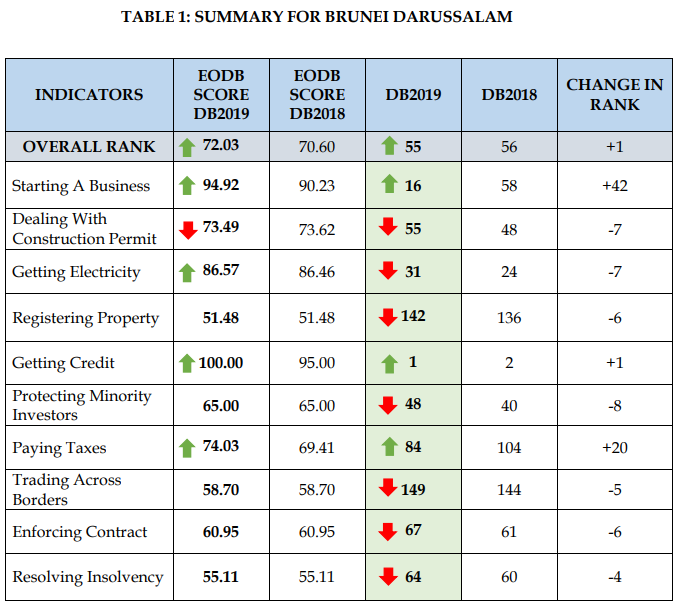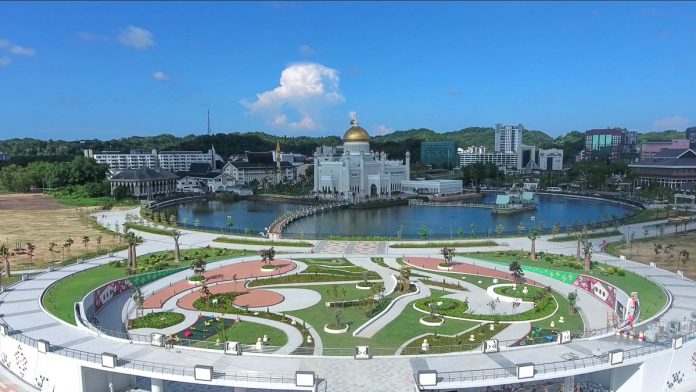Brunei has risen to 55 out of 190 economies in the World Bank’s latest rankings for ease of doing business, an improvement of one spot from the year prior.
The Sultanate’s score of 72.03 percent is the fourth highest amongst ASEAN countries, behind Thailand, Malaysia and Singapore who came second overall for the third consecutive year, with New Zealand clinching the top spot.
The 2019 edition of the report released last week ranks countries based off a percentage score that measures regulations affecting 10 key areas affecting the life of a business: starting a business, dealing with construction permits, getting electricity, registering property, getting credit, protecting minority investors, paying taxes, trading across borders, enforcing contracts and resolving insolvency.
Driving Brunei’s performance were improvements in getting credit – Autoriti Monetari Brunei Darussalam’s (AMBD) introduction of a credit scoring system that allows banks to evaluate lending more efficiently was recognized as being on par with New Zealand as the world’s best.
75.2 percent of adult residents are covered by Brunei’s credit registry, compared to 16.9 percent for the East Asia and Pacific region.
The improvements in getting credit also comes after the introduction of the Secured Transaction Order in 2016, which paved the way for the introduction of the Collateral Registry System (CRS) – which allows movable property such as cars, crops, and livestock – to be used as collateral for loans.
Brunei also recorded improvements in streamlining processes for starting a business, paying taxes and getting electricity.
The Registry of Companies and Business Names (ROCBN) has merged name reservation and company incorporation into a single step as well as removed the requirement of shared certificates to be stamped upon company incorporation. These reforms saw Brunei jump 42 places to 16th in the starting a business category.
Under paying taxes, the full utilization of e-Amanah, an online system for the employee provident fund (TAP) lead to an advancement in 20 places to 84th.
However the increased score in the category of getting electricity corresponded to a drop in rank from 24 to 31, as other countries made larger relative improvements.

In the areas of registering property, protecting minority investors, trading across borders, enforcing contracts and resolving insolvency, Brunei’s score remained unchanged from the year prior – but this also lead to a decline in rankings as other economies made larger gains.
Brunei’s only decrease in percentage score was in dealing with construction permits, which dropped 0.13 percent to 73.49 percent, corresponding to a rank of 55, down from 48 last year.
Brunei’s worst performing area was trading across borders, in which it came 149th.
The Sultanate’s rise to 55th overall marks the fourth consecutive year it has improved its ranking. Five years ago, Brunei was 105th, before making the annual ranking’s largest jumps in 2017 and 2018 by moving up 41 places cumulatively.
In a press statement, the Ease of Doing Business (EODB) Secretariat under Ministry of Energy, Manpower and Industry (MEMI), said the Brunei government would strive to improve its business ecosystem as it looks to diversify the economy.
Business reforms are regularly monitored by the EODB steering committee which is chaired by MEMI and involves several public departments and agencies.
EODB added that they were also engaging the private sector regularly for their feedback through a series of workshops over business-related processes and regulations.
Brunei also moved up two places to 62 out of 140 economies in the recent World Economic Forum’s Global Competitiveness Report 2018 which features a new methodology that takes stock of the fourth industrial revolution (GCI 4.0).
For the latest updates on business reforms visit www.business.gov.bn.












